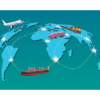When distributing products globally, there are many critical factors that manufacturers must consider in today’s increasingly complex regulatory environment. “Device manufacturers face several risks, including counterfeiting, pure theft, and security related to intellectual property,” says Mark Quinlan, director of healthcare strategy at UPS. “Many supply chains are being stretched as a result of international growth and movement into markets in which companies do not have the expertise.” In a Q&A with MedTech Intelligence, Quinlan discusses how device manufacturers should approach third-party logistics from a global perspective and the actions they should take to secure their supply chain.
 Mark Quinlan, director of healthcare strategy, UPSMTI: What steps should manufacturers take to protect their supply chain?
Mark Quinlan, director of healthcare strategy, UPSMTI: What steps should manufacturers take to protect their supply chain?
Quinlan: Companies can reduce their risk through collaboration, specifically by leveraging U.S. commercial services and partnering with international third-party logistics firms that have in-country resources. One of the first lines of defense involves adhering to in-country quality and regulatory requirements. If companies are leveraging international distributors as a sales channel or contract manufacturers within a new geography, typically either the U.S. commercial services, or logistics and transportation providers are a good reference to determine whether or not the party they’re engaging with has a good track record of adhering to regulatory requirements.
MTI: From an international perspective, what qualities should a manufacturer look for when engaging a third-party logistics provider?
Quinlan: It is important for the provider to have a person on staff with QA/RA expertise and that the provider is operating under a global platform to ensure their entire QA/RA team is both connected and understands the supply chain complexities in the specific market. The best fit would be having an in-country resource that understands the local requirements.
MTI: Are there common mistakes that companies make in their global supply chain strategy?
Quinlan: We encourage collaboration and for companies to leverage all the resources available to them. Many smaller companies don’t have the breadth of employees and the bandwidth to conduct the due diligence on potential partners with which they’re engaging.
In some cases, larger companies will make the mistake of selecting partners on a procurement basis alone, with cost being the primary deciding factor. This can lead to an increase in the number of players involved in different markets, increased complexity managing these players and introduces additional risk into the supply chain.
MTI: From a transportation standpoint, how can manufacturers reduce risk?
Quinlan: Criminals’ approach to cargo theft has increased in complexity, so supply chain executives have to stay one step ahead. Evaluation of current supply chain security protocols and implementation of stronger measures to protect their goods while in transit is an absolute necessity.
To start, companies should thoroughly investigate small breaches and inventory shrink that may show gaps in security. For example, if you have documented product loss, make sure your team conducts an investigation and assesses whether there truly is a problem so that you can address it.
Another best practice is to avoid moving high-value freight on holidays. In many cases, when you’re transporting product over a holiday, it will sit idle in a distribution yard and is much more likely to fall prey to theft.
Lastly, companies can invest in providing extra security by using a specific carrier that has GPS capability to ensure that drivers are safely hitting specific checkpoints. Some systems will also alert manufacturers to problems in transit so they immediately know when something has gone wrong.








